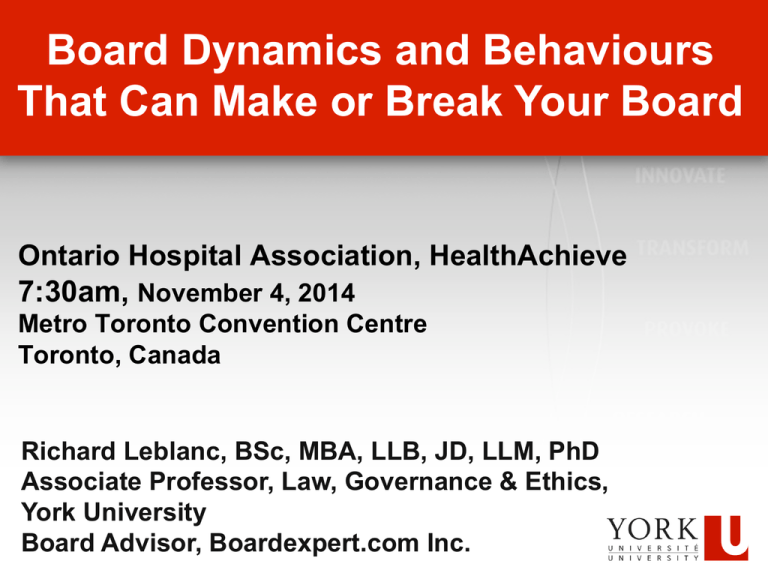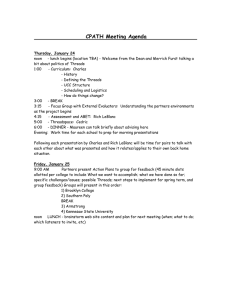
Board Dynamics and Behaviours
That Can Make or Break Your Board
Ontario Hospital Association, HealthAchieve
7:30am, November 4, 2014
Metro Toronto Convention Centre
Toronto, Canada
Richard Leblanc, BSc, MBA, LLB, JD, LLM, PhD
Associate Professor, Law, Governance & Ethics,
York University
Board Advisor, Boardexpert.com Inc.
2
Agenda
Ø 1. Definition and impact of board dynamics;
Ø 2. Methodology;
Ø 3. Board competencies and behaviours;
Ø 4. Case example;
Ø 5. Functional and dysfunctional director types;
Ø 6. Board composition and diversity;
Ø 7. Red flags for board dynamics;
Ø 8. How to deal with dysfunctional directors;
Ø 9. What should the Nominating Committee do?; and
Ø 10. Some real data.
Copyright © Richard Leblanc.
All rights reserved.
Continuing changes in governance
3
Copyright © 2011 Richard Leblanc.
All rights reserved.
The New Governance Normal (2014-15)
4
Copyright © 2011 Richard Leblanc.
All rights reserved.
Research and Practice
Proposition
5
There are no bad
companies, only
bad boards.
Copyright
Copyright
© 2011
© Richard Leblanc.
All rights reserved.
Research
and Practice
1. Definition
of Board
Dynamics
6
What a Board, and each
Committee and Director
says and does, that
contributes to, or detracts
from, effective review,
recommendation and
decision-making.
Copyright
Copyright
© 2011
© Richard Leblanc.
All rights reserved.
Research
and Practice
Impact
of Board
Dynamics
7
Copyright
Copyright
© 2011
© Richard Leblanc.
All rights reserved.
Methodology
8
n Investors
and policy makers: CCGG, OSFI, AGCO,
FICOM, OSC, FSCO;
n Companies:
n Work
150 organizations; > 500 interviews;
used with > 100 boards;
n Board
failure (judge, regulator, police) and expert witness;
n Governance
n Boards
training (York, Harvard, Texas);
and Advisors on LinkedIn (13,000 members);
n Activist
investors, private equity leaders, directors (NACD
100), CEOs (Top 100);
Copyright © Richard Leblanc.
All rights reserved.
Research, Teaching and Practice
9
Copyright © Richard Leblanc.
All rights reserved.
Research
What
doesand
governance
Practice failure look like?
10
Copyright
Copyright
© 2011
© Richard Leblanc.
All rights reserved.
3. Board Competencies and Behaviors
11
Copyright © Richard Leblanc.
All rights reserved.
4. Board composition: Case example
12
Broad strategic
role and
industry
knowledge
Copyright © Richard Leblanc.
All rights reserved.
Behaviors That Matter and Director Evaluation 13
Copyright © 2011 Richard Leblanc.
All rights reserved.
More Director Behaviors That
Should be Assessed, Recruited For
n Integrity
and personal / professional ethics;
n Communication
n Teamwork
n Impact,
14
skills: listening, speaking, writing;
skills: group, consensus, social, self aware;
influence, coaching and development;
n Leadership
/ chair skills: meeting, agenda, information;
n Intellectual
curiosity, bias to learn, quick study;
n Capacity
to challenge constructively: tone, words;
n Conscientiousness,
diligence, duty of care, preparation;
Copyright © Richard Leblanc.
All rights reserved.
15
5. Functional and Dysfunctional Director Types
Long-term
• multinational,
global
strategy;
• unrelated
diversificat
ion;
• product
differen.
/related
diversif.;
• complex
Time
restructurin
• replace
g;
• divestment
CEO;
• rapid
s; costcutting /
• acquisition
growth;
s;
• unfriendly
hypercompetmerger;
itive rivalry
(e.g.,
takeover)
• provide
counter Short-term
strategy to
controlling
IMPLEMENT = Longterm, difficult strategic
change
Collective
MAINTAIN = Long-term, less
difficult strategic change
Conformist
Controller
ConsensusBuilder
Change
Agent
Caretaker
Dissent
Conductor
Critic
Cheerleader
Challenger
INITIATE = Short-term,
difficult strategic change
Consensus
Individual
• monopolist
ic
environme
nt;
• regulated
change;
• friendly
merger of
equals;
• strategic
alliances;
• mature
industry;/
• monitor
• cooperative
coach
strategies;
CEO;
• external
negotiation
;
• crisis
Counsellor
manageme
nt;
• succession
planning;
• personal
REACT / MONITOR =
Short-term, less difficult strategiccontact
change
(e.g.,
director as
Copyright © Richard Leblanc.
All rights reserved.
Dysfunctional Director Types, continued
16
Behavior
D1
D2
D3
D4
D5
D6
D7
D8
D9
√
√
Conductor
Change Agent
Challenger
Counsellor
ConsensusBuilder
Caretaker
Controller
√
√
√
√
Critic
√
Cheerleader
Conformist
√
√
Copyright © Richard Leblanc.
All rights reserved.
6. Board composition and diversity
n Recent
n Self
n No
17
OSC initiative and Premier of Ontario;
interest, entrenchment, fixed size;
diversity definition, plan, policy, report or method;
n False
assertions, myths and code to block: CEO;
n Relationship
recruiting, group think and capture;
n Non-transparency
n Term
of director recruitment;
limits;
n Regulators
have shown they will act;
Copyright © Richard Leblanc.
All rights reserved.
Viviane Reding, EU Justice Commissioner
18
Copyright © Richard Leblanc.
All rights reserved.
Research
and Practice
7. Board
Dynamics
Red Flags
19
n Aggressive
CEO or any other
executive who tries to manage or
control the board or a committee;
n Board
Chair (or Committee Chair)
who cannot run an effective meeting,
set an agenda, or affect proper
information flow;
n A
Director or a Chair who is captured
by Management in some way;
Copyright
Copyright
© 2011
© Richard Leblanc.
All rights reserved.
Research
and Dynamics
Practice
Board
Red Flags
20
n A
Director who breaches
confidentiality;
n A
Director who does not support
board decisions;
n A
Director who acts out of self
interest;
n A
Director who says one thing, and
does another;
Copyright
Copyright
© 2011
© Richard Leblanc.
All rights reserved.
Research
and Dynamics
Practice
Board
Red Flags
21
n Lack
of diversity of opinion or
Directors;
n A
Chair who weighs in to early, or
unduly influences the collective
Board, or who is owned by the CEO;
n A
Director’s behavior: tone, approach,
frequency;
n A
Director who does not understand
the business model and industry;
Copyright
Copyright
© 2011
© Richard Leblanc.
All rights reserved.
Research
and Dynamics
Practice
Board
Red Flags
22
n An
over tenured (>9 years) or over
boarded (>2 boards) Director;
n A
Director who speaks on behalf of a
stakeholder, rather than the best
interests of the organization;
n A
Director or a Manager who is not
transparent, and/or cannot be trusted;
n A
Board that does not assess itself, or
its members, adequately or at all;
Copyright
Copyright
© 2011
© Richard Leblanc.
All rights reserved.
Research
and Dynamics
Practice
Board
Red Flags
23
n Undue
influence by a particular Director
or Manager;
n Over
reliance on one Director or
Manager;
n A
Board that is too large (> 13);
n An
Executive Committee;
n No,
or unproductive, Executive Sessions,
at all levels;
Copyright
Copyright
© 2011
© Richard Leblanc.
All rights reserved.
Research
and Dynamics
Practice
Board
Red Flags
24
n No
or inadequate succession planning
for the Board Chair, or a Committee
Chair;
n A
Board Chair inappropriately chosen,
not assessed;
n A
tone at the top of favortism;
n No
oversight functions to counter
management influence;
n Lack
of explicit roles and responsibilities;
Copyright
Copyright
© 2011
© Richard Leblanc.
All rights reserved.
Research
and Dynamics
Practice
Board
n Position
Red Flags
25
entrenchment (chairs, directors);
n Issue
entrenchment (retirement, term
limits, diversity) and self interest;
n Dysfunctional
directors (just takes one)
who pull the board down, take up
valuable positions;
n Two
people who do not get along who
introduce a governance oversight gap;
Copyright
Copyright
© 2011
© Richard Leblanc.
All rights reserved.
Research
9. Roleand
ofPractice
Nominating
Committee
26
n Director
assessment (US does not do)
by third parties from time to time (UK);
n Educate
on competencies, mentor on
behaviors;
n Remove
dysfunctional directors who do
not or cannot improve: tie to
renomination;
n Thorough
background checks to include
behaviors; manage recruiter / NC to
receive validation of behaviors;
Copyright
Copyright
© 2011
© Richard Leblanc.
All rights reserved.
10. Some Real Data
n Movement
27
to competencies and expertise;
n Questionnaire
(tailored);
n Interviews;
n Observation;
n Confidentiality
n 360
and anonymity;
degree evaluations;
n Internal
vs external;
Copyright © Richard Leblanc.
All rights reserved.
What should be evaluated re Chairs?
n Mandate/PD
28
at a minimum;
n Leadership;
n Integrity;
n Value
creation and mindset;
n Relationship
n Time
to CEO/direct reports;
and contribution;
Copyright © Richard Leblanc.
All rights reserved.
Sample of results
29
Copyright © Richard Leblanc.
All rights reserved.
Sample of results (individual roles – spread)
30
Copyright © Richard Leblanc.
All rights reserved.
Sample of results (leadership – spread)
31
Copyright © Richard Leblanc.
All rights reserved.
Director assessment
32
Copyright © Richard Leblanc.
All rights reserved.
Sample results (chair strengths)
33
Copyright © Richard Leblanc.
All rights reserved.
Sample results (director weaknesses)
34
Copyright © Richard Leblanc.
All rights reserved.
35
Disclosure of results of the evaluation (all types)
n Exclude
CEO and private sessions;
n Ownership
by chairs;
n Members/regulators
more demanding
of results and process;
n Eventually
n Sit
full disclosure all levels;
downs, development and follow up;
n Separate
sit down for chair;
Copyright © Richard Leblanc.
All rights reserved.
Acting on the results (all types)
n Director
profile;
n Chair
removal and evergreen
and CEO removal;
n Structure
(committees) and coverage;
n Reporting
n Red
36
and process;
flags and risks;
n Relationships
(too close, too far);
Copyright © Richard Leblanc.
All rights reserved.
you!
Comply or ExplainThank
Regime
n CSA
n EU
37
Staff Notice 58-306 (Dec10): unacceptable ;
Submission
Source: Basel (May 10), Europe (Dec 10) and FDIC (Feb 11)
Copyright
Copyright
© 2011
© Richard Leblanc.
All rights reserved.
Contact Information
38
Professor Richard Leblanc
Faculty of Liberal Arts & Professional Studies
York University
tel: (416) 736-2100 x 33744
Email: rleblanc@yorku.ca
Twitter: http://twitter.com/DrRLeblanc
Blog: http://www.canadianbusiness.com/author/richardleblanc
http://ca.linkedin.com/in/rwleblanc
LinkedIn Group:
Board Advisors
Copyright © Richard Leblanc.
All rights reserved.
Short bio
39
Professor Richard Leblanc (http://www.yorku.ca/rleblanc/) is an awardwinning teacher and researcher, consultant, lawyer and specialist on
corporate governance and accountability. He is a former recipient of
Canada’s Top 40 Under 40™award, was named as part of the NACD’s
D100 “people to watch,” received a teaching award as one of the top five
university teachers in Ontario, and was named to Canadian Who’s Who.
Professor Leblanc’s research expertise is in corporate governance,
specifically in the effectiveness of boards of directors. He blogs on these
issues for Canadian Business, Huffington Post Canada, and founded the
discussion group on LinkedIn, Boards and Advisors, which is one of the
largest and most active corporate governance groups on LinkedIn (>
13,000 members). He will provide hands on examples of how to
maneuver the challenges directors could face based on his extensive
service as an external advisor to boards that have won national awards
and peer endorsement from institutional shareholders for their corporate
governance practices.
Copyright © Richard Leblanc.
All rights reserved.



